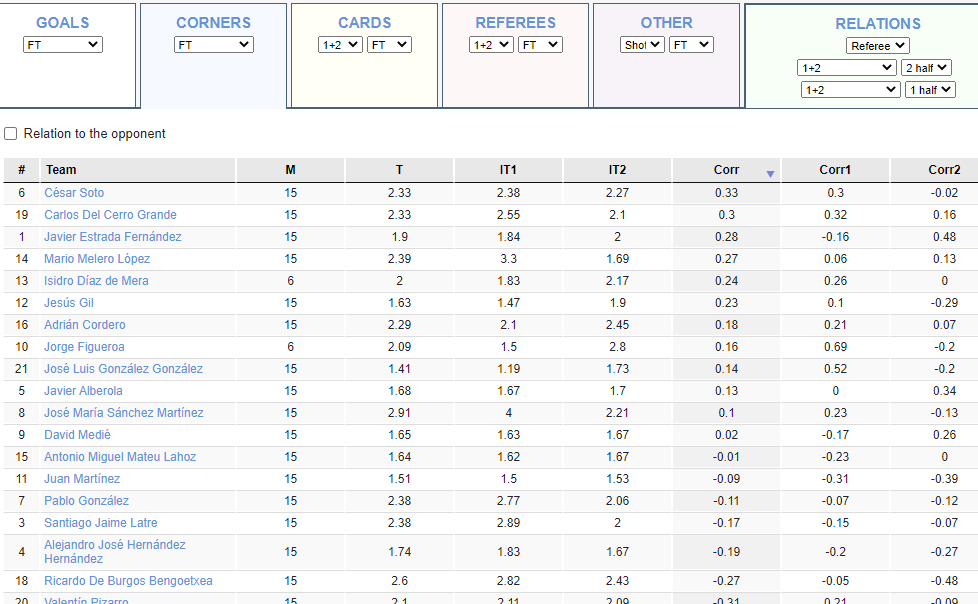Team
Referee
Compare Teams
Select Tournament
Main
England Spain Germany Italy France Ukraine Russia JapanClub International
World Europe South-america Asia Nc-america Africa OceaniaNational teams
World (National) Europe (National) South America (National) Asia (National) NC America (National) Africa (National) Oceania (National)Europe
Austria Azerbaijan Belarus Belgium Bosnia-herzegovina Bulgaria Croatia Cyprus Czech-republic Denmark Estonia Finland Georgia Greece Hungary Iceland Ireland-republic Israel Kazakhstan Latvia Lithuania Netherlands Northern-ireland Norway Poland Portugal Romania Scotland Serbia Slovakia Slovenia Sweden Switzerland Turkey WalesSouth America
Argentina Bolivia Brazil Chile Colombia Ecuador Paraguay Peru Uruguay VenezuelaAsia
Australia Bahrain China-pr Chinese-taipei Hong-kong India Indonesia Korea-republic Qatar Saudi-arabia Singapore Tajikistan Thailand Turkmenistan United-arab-emiratesNorth Central American and Caribbean
Canada Costa-rica El-salvador Honduras Mexico Nicaragua United-statesAfrica
Algeria Egypt Morocco Nigeria South-africaOceania
New-zealandAnalytics
Among other things, national team matches are also distinguished by a wide range of opponents. That is, a statistically average..
TOP MATCHES
| 17:30 |
|
Tottenham VS Liverpool Free! |
| 11:30 |
|
Konyaspor VS Kayserispor |
| 12:00 |
|
Bochum VS Karlsruhe |
| 12:30 |
|
Newcastle VS Chelsea |
| 12:30 |
|
Zirə IK VS Mil-Muğan FK |
| 12:30 |
|
Preston VS Norwich |
Once again, welcome to all fans of football and football statistics. As you know, the team of the professional football statistics service Corner-stats.com recently presented a new tool Referees Statistics Relations. Today we will demonstrate how this tool helps you learn the style of refereeing in a tournament.
Various combinations of cards and fouls, as well as statistics by halves are available in the Referees statistics relations tool. So let's take a look at the cards relations (by 1+2 system) in the 2nd and 1st halves for the Spanish La Liga referees (based on the last 15 referees matches in this and the previous seasons). The first 3 columns of the table contain the ratio of statistics (match total and teams total), and the last 3 - the correlation of statistics (the influence of one statistic on another). In the case of the referees, we are only interested in the relation and correlation of the match total.
What the correlation of cards of the 1st and 2nd halves tells us for the referees:
- if the correlation is about zero, we have no relation between the statistics, that is, in this case we cannot conclude how the cards of the 1st half affect the cards of the 2nd half;
- if the correlation is more than 0 (let's say more than 0.25), we have a direct dependence of the statistics. That is, if in the 1st half a referee shows a lot of cards, then in the second half they are also expected to be many. And vice versa, if in the first half a referee showed few cards, then in the second half he tends to show few cards also. In this case, the refereeing style can be described as adhering to one line during the match, in the case of the Spanish La Liga, these referees include Mario Melero López, Javier Estrada Fernández, Carlos Del Cerro Grande, César Soto;
- if the correlation is less than 0 (let's say less than -0.25), we have a negative relation. That is, if the referee shows a lot of cards in the 1st half, then in the 2nd half he tends to show fewer cards, and vice versa. In this case, the style of the referee can be described as "suffers fouls in the 1st half, and in the 2nd half he deals cards" or "at the first fouls he gives cards to show that he will not tolerate rough play, and then gives fewer cards" (the referees Eduardo Prieto, Guillermo Cuadra, José Munuera, Valentín Pizarro, Ricardo De Burgos Bengoetxea).
In contrast to correlation, the ratio of indicators shows how many times the first statistic is bigger than the second. For example, if we have decided on the total cards over in a match, we can further study the ratio of cards by halves for the referee of this match. If the referee's ratio is significantly higher than the league average, then it may make sense to bet exactly the total over of the 2nd half, and not the entire match, and similarly for the total under.
We hope this analytics was useful for you, and you will be able to draw the right conclusions based on it. Have a nice football!


 26'
26'
